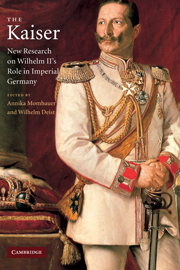Book contents
- Frontmatter
- Contents
- Notes on contributors
- Acknowledgements
- List of abbreviations
- Introduction
- Reflections on John Röhl: a Laudatio
- 1 Wilhelm II and ‘his’ navy, 1888–1918
- 2 Hollow-sounding jubilees: forms and effects of public self-display in Wilhelmine Germany
- 3 The Kaiser's elite? Wilhelm II and the Berlin administration, 1890–1914
- 4 Wilhelm, Waldersee, and the Boxer Rebellion
- 5 Dreams of a German Europe: Wilhelm II and the Treaty of Björkö of 1905
- 6 The uses of ‘friendship’. The ‘personal regime’ of Wilhelm II and Theodore Roosevelt, 1901–1909
- 7 Military diplomacy in a military monarchy? Wilhelm II's relations with the British service attachés in Berlin, 1903–1914
- 8 Wilhelm II as supreme warlord in the First World War
- 9 Germany's ‘last card’. Wilhelm II and the decision in favour of unrestricted submarine warfare in January 1917
- 10 Military culture, Wilhelm II, and the end of the monarchy in the First World War
- 11 Rathenau, Wilhelm II, and the perception of Wilhelminismus
- 12 Structure and agency in Wilhelmine Germany: the history of the German Empire – past, present, and future
- Index
5 - Dreams of a German Europe: Wilhelm II and the Treaty of Björkö of 1905
Published online by Cambridge University Press: 24 July 2009
- Frontmatter
- Contents
- Notes on contributors
- Acknowledgements
- List of abbreviations
- Introduction
- Reflections on John Röhl: a Laudatio
- 1 Wilhelm II and ‘his’ navy, 1888–1918
- 2 Hollow-sounding jubilees: forms and effects of public self-display in Wilhelmine Germany
- 3 The Kaiser's elite? Wilhelm II and the Berlin administration, 1890–1914
- 4 Wilhelm, Waldersee, and the Boxer Rebellion
- 5 Dreams of a German Europe: Wilhelm II and the Treaty of Björkö of 1905
- 6 The uses of ‘friendship’. The ‘personal regime’ of Wilhelm II and Theodore Roosevelt, 1901–1909
- 7 Military diplomacy in a military monarchy? Wilhelm II's relations with the British service attachés in Berlin, 1903–1914
- 8 Wilhelm II as supreme warlord in the First World War
- 9 Germany's ‘last card’. Wilhelm II and the decision in favour of unrestricted submarine warfare in January 1917
- 10 Military culture, Wilhelm II, and the end of the monarchy in the First World War
- 11 Rathenau, Wilhelm II, and the perception of Wilhelminismus
- 12 Structure and agency in Wilhelmine Germany: the history of the German Empire – past, present, and future
- Index
Summary
‘The 24th of July 1905 is a cornerstone in European politics’, Kaiser Wilhelm II declared in a letter to Tsar Nicholas II of Russia on the 27th of the same month, ‘and turns over a new leaf in the history of the world’. The occasion to which Wilhelm referred was the signing of a treaty of alliance between Germany and Russia by himself and Nicholas at Björkö, off the southern coast of Finland. The treaty, although restricted to Europe, would have had the effect of neutralising the Dual Alliance between France and Russia which had been concluded in 1894, thus freeing Germany from the danger of a war on two fronts. In addition, it was designed to pave the way for a continental league, involving the participation of all the Great Powers of the European mainland, including France, against the British Empire. The aim of the treaty was therefore to effect a diplomatic revolution that would have left Germany with de facto mastery of the European continent. The Kaiser would have achieved the objective that he had set himself early in his reign, when he had declared to his closest friend and political confidant Philipp Count zu Eulenburg-Hertefeld that the ‘fundamental principle’ of his European policy was ‘leadership in the peaceful sense – a sort of Napoleonic supremacy’. Wilhelm was therefore correct in relation to the potential importance of the agreement which he had concluded with the Tsar.
- Type
- Chapter
- Information
- The KaiserNew Research on Wilhelm II's Role in Imperial Germany, pp. 119 - 142Publisher: Cambridge University PressPrint publication year: 2003
- 1
- Cited by



